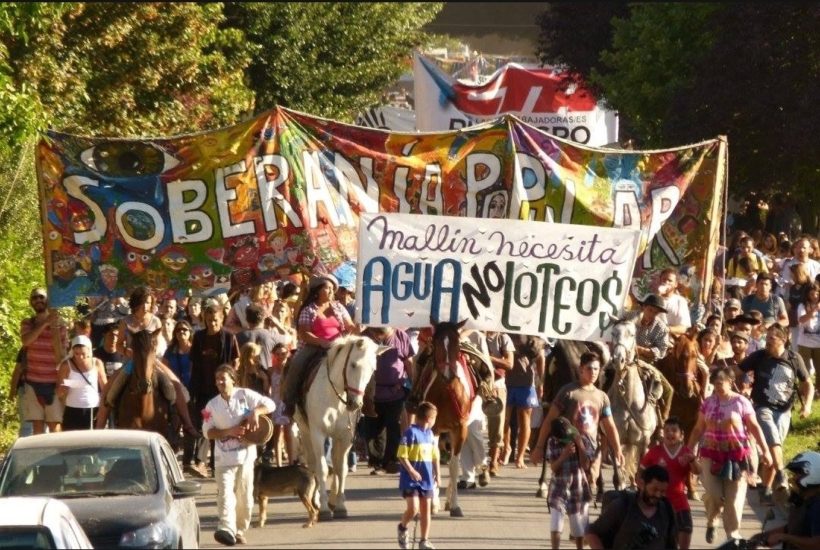In the framework of the Open Encounter of New Humanism, called “The human being as a central value”, we reflect on “Maldesarrollo” or “Bad-Development”. The problem of land development in Pampa de Ludden in the Cordillera.
By Claudia Rivero
Maldesarrollo is a concept that arose some forty or fifty years ago when the development programmes that had been implemented globally began to be questioned, and which had been a total failure in terms of achieving social welfare. This degree of development was supposed to end poverty and inequality, and this did not happen, because economic growth was not accompanied by freedom and human rights.
Development programmes failed in the so-called underdeveloped and developed countries. Hence the use of the word “underdevelopment”, used by several authors, including Vandana Shiva, the Indian physicist and ecofeminist activist. She says: “the poverty that development generates is absolute and threatens the very survival of millions of beings on this planet. Misdevelopment is the violation of the integrity of interconnected and interdependent organic systems that sets in motion a process of exploitation, inequality, injustice and violence”.
This concept helps us to give a global framework to the question of the commodification of land, environmental devastation, appropriation by dispossession, extractivism. And it also leads us to the notion of “urban extractivism”, no longer through mega-mining or soya but through real estate speculation that causes population displacement, appropriates public property, causes environmental damage and challenges the balance of nature in a framework of institutional and social degradation, the surrender of state lands, the conversion or deterioration of rural economies, among other evils, which we can represent through real estate projects that are installed on wetlands, gated communities, among others.
And this is where we come to the land development project in the Pampa de Ludden, in El Bolsón, in the Andean Mountain range of Río Negro, which subscribes to this form of capitalist extractivism.
The so-called Pampa de Ludden is an extensive area located to the northwest of the city of El Bolsón, in the Andes Mountains in the province of Rio Negro, in a border security zone.
It is associated by its proximity to a region called Cumbreras de Mallín Ahogado, Loma Atravesada, which is a Municipal Reserve. All this integrated area, due to its complementary characteristics, groups together approximately 1,500 hectares. It is located at an altitude of over 900 meters above sea level, and is a vital water catchment area.
It is part of the Andean-North Patagonian Biosphere Reserve declared by UNESCO in 2007, an ecoregion of 2,500,000 hectares of temperate forests located in the North Patagonian Mountain range. It is a periglacial zone with mallines (mountain wetlands) and groundwater reserves that have not yet been sufficiently studied. It constitutes a buffer zone for the Rio Azul-Lago Escondido Natural Protected Area (ANPRALE), adjacent to the Pampa de Ludden, where urbanisation is not allowed as it is non-residential.
This real estate project has its correlate. In 2004 and 2005, a private airfield was proposed to be built there by the English investor Joseph “Joe” Lewis. It is important to say that the tycoon’s Estancia Lago Escondido is very close to the site, but the aerodrome did not prosper when transgressions to provincial and national laws were denounced. A few years later, in 2010, a VIP development was announced in Pampa de Ludden, a few kilometres from the Perito Moreno hill, by the company Laderas SA, which in turn has a concession for the ski centre. It could be closely linked to the English businessman known for preventing public access to Lake Escondido.
The first stage of the subdivision project intends to advance on almost 300 hectares of native forest in which 312 individual plots will be delimited. The impact of urban development projects on productive areas that are currently affected by a ten-year water crisis would immediately complicate the water supply and the ecological and socio-economic conditions of thousands of families throughout the region in the two provinces that share the basin.
In addition, it would enable adjoining properties to gain access to the possibility of further land development. In this way, land value projections would lead to the loss of Mallín Ahogado’s productive agricultural, livestock and forestry role, which is the pillar of its social and territorial status.
The real estate project provoked a high degree of social conflict with four mass marches, three in 2017 and one in 2021, in which the population demonstrated unity and strength. The concern of the rural inhabitants and their organisations and their mobilisation continues, in defence of the land, water and the possibility of rural life in harmony with the nature of the mountains.
Claudia Rivero is an environmental activist, member of the Asamblea en defensa del Agua y la Tierra. El Bolsón, Andean-Patagonian Cordillera, Rio Negro province, Argentina.










